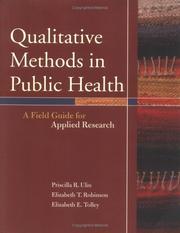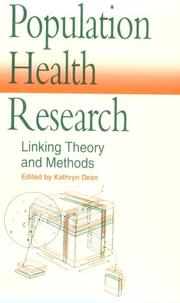| Listing 1 - 7 of 7 |
Sort by
|

ISBN: 0787976342 9780787976347 Year: 2005 Publisher: San Francisco, CA : Jossey-Bass,
Abstract | Keywords | Export | Availability | Bookmark
 Loading...
Loading...Choose an application
- Reference Manager
- EndNote
- RefWorks (Direct export to RefWorks)
Public Health. --- Qualitative Research. --- Research Design. --- Public health --- Qualitative research. --- Santé publique --- Recherche qualitative --- Research --- Methodology. --- Recherche --- Méthodologie --- Qualitative research --- Public Health --- Qualitative Research --- Research Design --- Methodology --- Santé publique --- Méthodologie --- Public health - Research - Methodology

ISBN: 080398751X 0803987528 9780803987517 Year: 1993 Publisher: London Sage
Abstract | Keywords | Export | Availability | Bookmark
 Loading...
Loading...Choose an application
- Reference Manager
- EndNote
- RefWorks (Direct export to RefWorks)
Hygiene. Public health. Protection --- Demography --- Public health --- Research --- Methodology. --- 316:61 --- -#SBIB:316.334.3M12 --- #SBIB:303H12 --- Community health --- Health services --- Hygiene, Public --- Hygiene, Social --- Public health services --- Public hygiene --- Sanitary affairs --- Social hygiene --- Health --- Human services --- Biosecurity --- Health literacy --- Medicine, Preventive --- National health services --- Sanitation --- Medische sociologie --- -Methodology --- Medische sociologie: methoden en technieken --- Methoden en technieken: sociale wetenschappen --- 316:61 Medische sociologie --- #SBIB:316.334.3M12 --- Research&delete& --- Methodology --- Public health - Research - Methodology.
Book
ISBN: 9783319097343 3319097334 9783319097336 3319097342 Year: 2015 Publisher: Cham : Springer International Publishing : Imprint: Springer,
Abstract | Keywords | Export | Availability | Bookmark
 Loading...
Loading...Choose an application
- Reference Manager
- EndNote
- RefWorks (Direct export to RefWorks)
The history of public health has focused on direct relationships between problems and solutions: vaccinations against diseases, ad campaigns targeting risky behaviors. But the accelerating pace and mounting intricacies of our lives are challenging the field to find new scientific methods for studying community health. The complexities of place (COP) approach is emerging as one such promising method. Place and Health as Complex Systems demonstrates how COP works, making an empirical case for its use in for designing and implementing interventions. This brief resource reviews the defining characteristics of places as dynamic and evolving social systems, rigorously testing them as well as the COP approach itself. The study, of twenty communities within one county in the Midwest, combines case-based methods and complexity science to determine whether COP improves upon traditional statistical methods of public health research. Its conclusions reveal strengths and limitations of the approach, immediate possibilities for its use, and challenges regarding future research. Included in the coverage: Characteristics of places and the complexities of place approach. The Definitional Test of Complex Systems. Case-based modeling using the SACS toolkit. Methods, maps, and measures used in the study. Places as nodes within larger networks. Places as power-based conflicted negotiations. Place and Health as Complex Systems brings COP into greater prominence in public health research, and is also valuable to researchers in related fields such as demography, health geography, community health, urban planning, and epidemiology. .
Medicine & Public Health. --- Public Health. --- Complexity. --- Statistical Physics, Dynamical Systems and Complexity. --- Human Geography. --- Medicine. --- Public health. --- Physics. --- Engineering. --- Médecine --- Santé publique --- Physique --- Ingénierie --- Public health -- Research -- Methodology. --- Public health -- Research. --- Public Health --- Health & Biological Sciences --- Public Health - General --- Public health --- Research. --- Research --- Methodology. --- Public health research --- Statistical physics. --- Dynamical systems. --- Complexity, Computational. --- Human geography. --- Complex Systems. --- Statistical Physics and Dynamical Systems. --- Physics --- Mathematical statistics --- Anthropo-geography --- Anthropogeography --- Geographical distribution of humans --- Social geography --- Anthropology --- Geography --- Human ecology --- Construction --- Industrial arts --- Technology --- Statistical methods --- Computational complexity. --- Dynamical systems --- Kinetics --- Mathematics --- Mechanics, Analytic --- Force and energy --- Mechanics --- Statics --- Complexity, Computational --- Electronic data processing --- Machine theory --- Community health --- Health services --- Hygiene, Public --- Hygiene, Social --- Public health services --- Public hygiene --- Social hygiene --- Health --- Human services --- Biosecurity --- Health literacy --- Medicine, Preventive --- National health services --- Sanitation
Book
ISBN: 1461455162 1461455170 1283908069 Year: 2013 Publisher: New York : Springer,
Abstract | Keywords | Export | Availability | Bookmark
 Loading...
Loading...Choose an application
- Reference Manager
- EndNote
- RefWorks (Direct export to RefWorks)
Respect for persons, beneficence, and justice are the principles that collectively form the ethical basis of human research . These three principles find expression in Community-Based Participatory Research for Improved Mental Healthcare, or CBPR – a systematic approach for engaging specially-defined groups of people in a process of inquiry and social change. In Community-Based Participatory Research, a panel of renowned authors provide a step-by-step approach for conducting CBPR, providing all the conceptual and methodological guidelines needed to implement this important and extremely fruitful research approach. As early career investigators use this mode of collaborative inquiry in the service of society, an exciting and entirely new capacity for ethically sound and more rigorous and consequential science can be built. An indispensable resource that will be of great interest to researchers from a wide array of disciplines, Community-Based Participatory Research for Improved Mental Healthcare is a major addition to the literature and certain to become the gold standard reference in the field.
Community health services. --- Health -- Research -- Methodology. --- Public health -- Research -- Methodology. --- Qualitative research -- Methodology. --- Community psychiatry --- Social psychiatry --- Participant observation --- Health Services Research --- Community Health Services --- Mental Health Services --- Research --- Health Care Quality, Access, and Evaluation --- Health Services --- Behavioral Disciplines and Activities --- Science --- Health Care Facilities, Manpower, and Services --- Health Care --- Psychiatry and Psychology --- Natural Science Disciplines --- Disciplines and Occupations --- Community Mental Health Services --- Community-Based Participatory Research --- Psychiatry --- Health & Biological Sciences --- Psychiatry - General --- Community mental health services. --- Citizen participation. --- Mental health clinics --- Medicine. --- Public health. --- Primary care (Medicine). --- Psychiatry. --- Medicine & Public Health. --- Primary Care Medicine. --- Public Health. --- Alternatives to psychiatric hospitalization --- Community health services --- Mental health services --- Medicine and psychology --- Mental health --- Psychology, Pathological --- Emergency medicine. --- Medicine, Emergency --- Medicine --- Critical care medicine --- Disaster medicine --- Medical emergencies --- Community health --- Health services --- Hygiene, Public --- Hygiene, Social --- Public health services --- Public hygiene --- Social hygiene --- Health --- Human services --- Biosecurity --- Health literacy --- Medicine, Preventive --- National health services --- Sanitation --- Primary medical care --- Medical care

ISBN: 076194771X 9780761947714 0761947701 Year: 2004 Publisher: London Sage
Abstract | Keywords | Export | Availability | Bookmark
 Loading...
Loading...Choose an application
- Reference Manager
- EndNote
- RefWorks (Direct export to RefWorks)
Qualitative research --- Medical care --- Public health --- Research --- Qualitative Research --- Data Collection --- Methodology --- methods --- #SBIB:316.334.3M12 --- Medische sociologie: methoden en technieken --- Gezondheidszorg ; onderzoek --- Biomathematics. Biometry. Biostatistics --- Sociology of health --- Qualitative methods in social research --- #SBIB:043.IOS --- #SBIB:303H30 --- Qualitative analysis (Research) --- Qualitative methods (Research) --- Community health --- Health services --- Hygiene, Public --- Hygiene, Social --- Public health services --- Public hygiene --- Sanitary affairs --- Social hygiene --- Health --- Human services --- Biosecurity --- Health literacy --- Medicine, Preventive --- National health services --- Sanitation --- Delivery of health care --- Delivery of medical care --- Health care --- Health care delivery --- Healthcare --- Medical and health care industry --- Medical services --- Personal health services --- Research&delete& --- Kwalitatieve methoden: algemeen --- Soins médicaux --- Santé publique --- Recherche qualitative --- Recherche --- Medical care - Research - Methodology --- Public health - Research - Methodology --- Research - methods --- Data Collection - methods
Book
ISBN: 9780520277953 9780520277946 0520277945 0520277953 1322105464 0520958497 9780520958494 9781322105468 Year: 2014 Publisher: Oakland, California
Abstract | Keywords | Export | Availability | Bookmark
 Loading...
Loading...Choose an application
- Reference Manager
- EndNote
- RefWorks (Direct export to RefWorks)
The study of migrant populations poses unique challenges owing to the mobility of these groups, which may be further complicated by cultural, educational, and linguistic diversity as well as the legal status of their members. These barriers limit the usefulness of both traditional survey sampling methods and routine public health surveillance systems. Since nearly 1 in 7 people in the world is a migrant, appropriate methodological approaches must be designed and implemented to capture health data from populations. This effort is particularly important because migrant populations, in comparison to other populations, typically suffer disparities related to limited access to health care, greater exposure to infectious diseases, more occupational injuries, and fewer positive outcomes for mental health and other health conditions. This path-breaking handbook is the first to engage with the many unique issues that arise in the study of migrant communities. It offers a comprehensive description of quantitative and qualitative methodologies useful in work with migrant populations. By providing information and practical tools, the editors fill existing gaps in research methods and enhance opportunities to address the health and social disparities migrant populations face in the United States and around the world.
Public health --- Immigrants --- Emigration and immigration --- Research --- Methodology --- Health and hygiene --- Health aspects --- Methodology. --- Emigration and immigration -- Health aspects. --- Health. --- Immigrants -- Health and hygiene. --- Immigrants -- Medical care. --- Immigrants -- Social conditions. --- Migration. --- Health Status --- Methods --- Delivery of Health Care --- Persons --- Demography --- Science --- Health Care Quality, Access, and Evaluation --- Investigative Techniques --- Patient Care Management --- Named Groups --- Population Characteristics --- Epidemiologic Measurements --- Health Care --- Analytical, Diagnostic and Therapeutic Techniques and Equipment --- Social Sciences --- Natural Science Disciplines --- Health Services Administration --- Disciplines and Occupations --- Public Health --- Anthropology, Education, Sociology and Social Phenomena --- Environment and Public Health --- Health Status Disparities --- Healthcare Disparities --- Research Design --- Emigrants and Immigrants --- Health & Biological Sciences --- Public Health - General --- Emigrants --- Foreign-born population --- Foreign population --- Foreigners --- Migrants --- Aliens --- Public health - Research - Methodology --- Immigrants - Health and hygiene - Research - Methodology --- Emigration and immigration - Health aspects --- anthropology. --- cultural diversity. --- educational diversity. --- epidemiology. --- ethical concerns. --- ethnographic research. --- global health. --- health conditions. --- health data. --- health. --- human condition. --- immigrant health. --- immigration and immigrants. --- infectious diseases. --- legal status. --- linguistic diversity. --- medical. --- mental health. --- migrant communities. --- migrant populations. --- migrant. --- migrants in europe. --- migrants in the united states. --- migration. --- mobility. --- occupational injuries. --- participant observation. --- public health. --- surveillance systems.
Book
ISBN: 9781473997110 9781473997103 1473997100 1473997119 Year: 2018 Publisher: Los Angeles : SAGE,
Abstract | Keywords | Export | Availability | Bookmark
 Loading...
Loading...Choose an application
- Reference Manager
- EndNote
- RefWorks (Direct export to RefWorks)
This is a practical introduction to designing, conducting and appraising qualitative research in areas such as public health, health services research, nursing and health promotion.--
Qualitative research --- Medical care --- Public health --- Research --- Qualitative Research --- Data Collection --- Methodology --- methods --- Research Design --- Qualitative analysis (Research) --- Qualitative methods (Research) --- Delivery of health care --- Delivery of medical care --- Health care --- Health care delivery --- Health services --- Healthcare --- Medical and health care industry --- Medical services --- Personal health services --- Research&delete& --- Evaluation --- Research, Qualitative --- Anthropology, Cultural --- Focus Groups --- Data Collection Methods --- Dual Data Collection --- Collection Method, Data --- Collection Methods, Data --- Collection, Data --- Collection, Dual Data --- Data Collection Method --- Method, Data Collection --- Methods, Data Collection --- Medical History Taking --- Empirical Research --- Data Adjustment --- Data Reporting --- Design, Experimental --- Designs, Experimental --- Error Sources --- Experimental Designs --- Matched Groups --- Methodology, Research --- Problem Formulation --- Research Methodology --- Research Proposal --- Research Strategy --- Research Technics --- Research Techniques --- Scoring Methods --- Experimental Design --- Adjustment, Data --- Adjustments, Data --- Data Adjustments --- Design, Research --- Designs, Research --- Error Source --- Formulation, Problem --- Formulations, Problem --- Group, Matched --- Groups, Matched --- Matched Group --- Method, Scoring --- Methods, Scoring --- Problem Formulations --- Proposal, Research --- Proposals, Research --- Reporting, Data --- Research Designs --- Research Proposals --- Research Strategies --- Research Technic --- Research Technique --- Scoring Method --- Source, Error --- Sources, Error --- Strategies, Research --- Strategy, Research --- Technic, Research --- Technics, Research --- Technique, Research --- Techniques, Research --- Clinical Trials Data Monitoring Committees --- #SBIB:303H30 --- #SBIB:316.334.3M12 --- Kwalitatieve methoden: algemeen --- Medische sociologie: methoden en technieken --- Medical care - Research - Methodology --- Public health - Research - Methodology --- Research - methods --- Data Collection - methods --- Research Design. --- Qualitative Research. --- Health and Fitness. --- Qualitative research. --- Health and Wellbeing. --- Research. --- Methodology. --- Evaluation. --- methods.
| Listing 1 - 7 of 7 |
Sort by
|

 Search
Search Feedback
Feedback About UniCat
About UniCat  Help
Help News
News